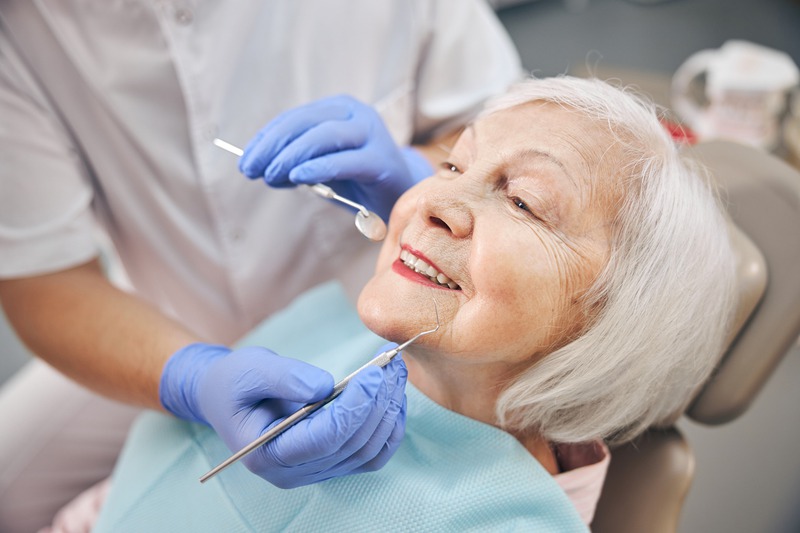Oral health in elderly people presents unique challenges that caregivers and family members must address. Seniors may face a variety of dental concerns, such as dry mouth, gum disease, tooth decay, and other age-related dental issues. Maintaining quality oral hygiene for older adults requires consistent care, preventive practices, and professional assistance. Supporting dental care for seniors ensures comfort, good nutritional intake, and improved overall wellness.
What Steps Can I Take to Maintain Seniors’ Dental Health?
Adopting a Regular Oral Care Routine
Creating a daily dental care routine for seniors ensures the health of their teeth. Brush twice daily with a soft-bristled toothbrush to avoid gum irritation and sensitivity. Selecting toothpaste with fluoride helps strengthen tooth enamel and minimizes cavities.
Aside from brushing, flossing daily is equally essential for senior dental care. Seniors should floss gently between teeth to remove trapped food particles and reduce plaque buildup. If traditional flossing proves challenging, utilizing floss holders or specially-designed interdental brushes can ease this practice.
Promoting Healthy Nutrition Habits
Seniors often face difficulties in maintaining a balanced diet, leading to nutritional deficiencies and oral health issues. Encourage eating fresh fruits, vegetables, lean proteins, whole grains, and dairy products. Healthy dietary choices help promote stronger teeth, healthier gums, and improved immunity.
Limit intake of sugars and acidic foods that increase risks of cavities and tooth erosion. Adequate hydration remains essential; water helps rinse food residues and balances acidity levels. Additionally, drinking water throughout the day hydrates older adults, combats dry mouth, and supports optimal oral functioning.
Consistent Dental Check-ups and Cleanings
Regular professional dental visits significantly benefit elderly individuals. Frequent professional cleanings and examinations identify potential dental complications at an early stage. Dentists proficient in areas like preventative dentistry Central Park can provide treatments to maintain teeth longevity and comfort.
Consistent evaluations from experienced dental providers enable proactive care addressing dental discomfort or harm immediately. Scheduling senior dental visits at intervals of six months can effectively identify issues including gum diseases, tooth decay, oral lesions, and recommend appropriate treatments. Professional cleanings reduce tartar accumulation and minimize potential complications while maintaining a healthy oral environment.
Implementing Denture Care Practices
If the senior uses dentures, adopt dedicated denture hygiene practices. Proper cleaning eliminates food particles, bacteria buildup, and prevents infections. Cleaning dentures daily by brushing gently with specialized denture brushes and soaking overnight in a denture-cleaning solution keeps them bacteria-free, clean, and comfortable.
Encouraging seniors to remove dentures overnight allows gums and oral tissues relaxation and rejuvenation. Continuous denture use can cause tissue irritation, discomfort, or infections. Address denture fit issues promptly; improperly fitting dentures increase discomfort, speech issues, chewing inconveniences, and oral sores, impacting significantly on seniors’ quality of life.
Addressing Dry Mouth Issues
Dry mouth frequently occurs among seniors, resulting from medication side effects, systemic medical conditions, or reduced fluid intake. Persistent dry mouth results in heightened cavity risk, gum conditions, oral sores, and decreased dental comfort. Address symptoms promptly through fluid hydration measures, sugar-free chewing gum or candies for saliva stimulation, and saliva replacement products.
Consult professionals offering services like Central Park South TMJ treatment to help recognize and treat underlying issues causing dry mouth and oral discomfort in elderly individuals. Regular consultation with qualified professionals ensures timely detection and management, assisting seniors in leading more comfortable, healthy oral lives.
Encouraging Seniors’ Independence in Oral Health Care
Where possible, empower seniors by involving them directly in their oral care routines. Provide practical solutions to overcome limitations they may experience, like arthritis or mobility concerns. Modified toothbrush handles, electronic toothbrushes, or flossing aids might provide seniors with enhanced accessibility and self-sufficiency in oral care.
Establish an atmosphere of encouragement and support rather than dependency. Praising daily efforts boosts confidence, ensures consistency in practices, and enhances seniors’ attitudes towards maintaining their dental health independently. Their active participation additionally enables caregivers to recognize areas requiring attention or adjustments in seniors’ oral health routines.
Recognizing and Managing Gum Disease Early
Gum diseases frequently emerge in older adults due to contributing factors, including plaque accumulation and inadequate oral hygiene. Increased awareness allows prompt detection of symptoms like bleeding, swollen gums, soreness, discomfort, or sensitivity when eating certain foods. Early detection and preventive measures help combat gum recession, tooth loss risks, infections, and further oral health repercussions.
Seek professional attention promptly if signs indicate potential gum disease. Dental professionals deliver effective hygiene practices, thorough cleaning sessions, and therapeutic measures addressing existing gum conditions. Timely, proactive interventions protect senior dental health from longer-term damage and promote overall comfort and wellness.
Effective Communication with Dental Professionals
Communication between caregivers, family members, seniors, and dental care providers enhance quality outcomes of oral care services. Inform providers accurately about the seniors’ general health, medication lists, changes in medical conditions, and challenges experienced when performing dental hygiene tasks. Detailed information facilitates personalized services, identifying specialized assessments, scheduling, or treatments adapted to seniors’ specific needs and conditions.
Select reliable and compassionate oral practitioners, such as those at Studio 57 Exceptional Dentistry, who prioritize communicating clearly, patiently, and respectfully. Positive communication builds trust between seniors and providers, enhancing adherence to recommended dental hygiene protocols. Good provider-patient relationships improve consistency in scheduling oral check-ups and routine maintenance, and effectively promote senior dental health.
Oral Cancer Screenings and Vigilance
Seniors frequently become susceptible to oral cancers. Regular screenings by qualified dental professionals detect carcinogenic changes that emerge early. Monitoring potential abnormal oral changes, including lumps, unexplained soreness, discolored patches, or oral wounds, supports early diagnosis, enhancing effective treatment possibilities.
-
Encourage seniors to regularly examine their mouths in front of mirrors, observing inside cheeks, gums, tongue, upper palate, and lips.
-
Report concerning changes promptly for professional evaluation ensuring quicker interventions and better treatment outcomes.
-
Avoiding tobacco products and excessive alcohol consumption significantly reduces oral cancer possibility, effectively improving oral health.
Creating a Comfortable Environment for Oral Care
Maintaining comfort during oral hygiene activities significantly influences seniors’ receptiveness. Plan dental hygiene sessions for times when seniors seem more energized and cooperative. Consider comfortable seating arrangements, good lighting, and using mirrors to promote independent participation and feedback on personal dental health care activities.
-
Explain procedures clearly yet gently, maintaining patient and empathetic communication.
-
Acknowledge fears, sensitive oral tissues, or discomfort, verbally expressed or observed.
-
Adjust practices accordingly, enhancing seniors’ confidence regarding overall dental activities and subsequent comfort.
Final Thoughts
Supporting oral health effectively for seniors demands consistent, deliberate care. Addressing unique dental concerns of aging individuals through preventive hygiene routines, regular professional dental assessments, promoting healthy nutrition, proactive monitoring, effective communication, and maintaining comfortable caregiving environments enhances their overall oral health. Providing dedicated, respectful attention guarantees elderly dental comfort, improved well-being, and an enhanced quality of life.


